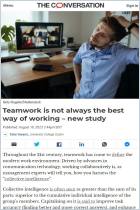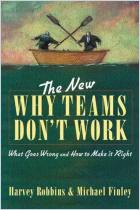
Why some teams boost motivation while others totally sap it
Working in a team can inspire striving – or encourage free-riding. What makes a difference is how the teamwork is designed.
Recommendation
Conventional wisdom suggests that teams can achieve more than individuals. Yet teamwork can be a soul-destroying experience — for example, when a classmate slacks on a group project. In German, the word “team” offers a tongue-in-cheek acronym that stands for Toll, ein anderer macht’s, (“Great, someone else does it”). But if you carefully design your team’s work, according to TU Dortmund University researchers Ann-Kathrin Torka, Jens Mazei, and Joachim Hüffmeier, the acronym can stand for “together, everyone achieves more.” Their treatise provides a helpful blueprint for boosting team performance.
Summary
About the Authors
Ann-Kathrin Torka is researching a PhD in psychology at TU Dortmund University, where Jens Mazei is a postdoctoral researcher, and Joachim Hüffmeier is professor for social, work, and organizational psychology.






















Comment on this summary or Iniciar a Discussão